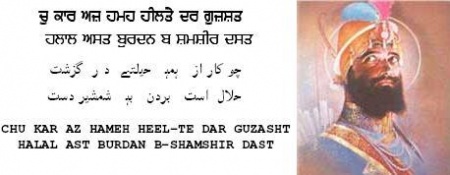Zafarnama index

Zafarnama (Gurmukhi: ਜ਼ਫ਼ਰਨਾਮਹ or ਜ਼ਫ਼ਰਨਾਮਾ, Persian: ظٝرنام) means the "Declaration of Victory" or "Formal Letter of Victory" and is the name given to the letter sent by the tenth Sikh Guru, Guru Gobind Singh in 1705 to the Emperor of India, Aurangzeb. The letter is written in exquisite Persian verse. In this letter, Guru Ji reminds Aurangzeb how he and his henchmen had broken their oaths taken on the holy Koran. Zafarnama is included in Hikayats (this is the name of Bani (composition) in the Dasam Granth) and Zafarnama is the first Hikayat in this composition.
Background
Despite this deception, this treacherous leader could not harm the Guru. Guru Ji states in this letter that in spite of his several sufferings, he had won a moral victory over the crafty Mughal who had broken all his vows and had resorted to underhand behaviour. Despite sending a huge army to capture or kill the Guru, the Mughal forces did not succeed in their mission.
The letter reads like a reprimand by a superior personality on a higher plane to a cruel and distorted inhuman being on a lower and pitiful plane. Guru Ji in the 111 verses of this notice rebukes Aurangzeb for his weaknesses as a human being and for excesses as a leader. Guru Ji confirms his confidence and his unflinching faith in the Almighty even after suffering extreme personal loss.
Special references
Of the 111 verses, the maximum numbers of 34 verses are to praise God; 32 deal with Aurangzeb’s invitation for the Guru to meet him and the Guru's refusal to meet the Emperor - instead Guruji asks Aurangzeb to visit him going so far as to guarantee that no harm will come to him. Though parts of the letter are an indictment of Aurangzeb and the treachery of his Mughal Generals and forces, other parts of the letter are like one from an older wiser veer (brave or valiant brother) more in touch with the part of the jyot (light) of God in his heart, who though terribly wronged on one plane, is asking his lost veer, who he sees as having lost touch with the promise of his own religion and its Holy Koran, to return to the fold of brotherly love and make things right between them again. Amazingly 6 verses actually praise Aurangzeb.
24 verses detail the events in the Battle of Chamkaur, which took place on 21 and 22 December 1704; 15 verses reprove Aurangzeb for breaking written promises given by him and his Officers, written in the blank pages of a copy of the Qur'an, given to the Guru; In verses 78 and 79, the Master had also warned Aurangzeb about the resolve of the Khalsa not to rest until his empire and its evil practises is driven out of India or destroyed.
Index
| 1. | Verses 1 to 12 | Praise to Almighty God (13 couplets) |
| 2. | Verses 13 to 18 | Lost all trust in Aurangzeb's promises (6 couplets) |
| 3. | Verses 19 to 41 | Guruji gives an account of the Battle of Chamkaur(23 couplets) |
| 4. | Verses 42 to 70 | Guru Ji has described the night scene when he came out of the Chamkaur Garh Invites Aurangzeb to come and meet the Guru |
| 5. | Verses 71 to 75 | Praise of Almighty God (5 Couplets) |
| 6. | Verses 76 to 88 | "Auranzeb, you have the burden of the Koran’s oath on your head" (13 Couplets) |
| 7. | Verses 89 to 94 | Guru Ji has even praised Aurangzeb (6 Couplets) |
| 8. | Verses 95 to 111 | Invincibility of the Lord and of Righteousness; "Every person who follows the path of truthfulness, the compassionate Almighty always showers mercy on him" (17 Couplets) |
